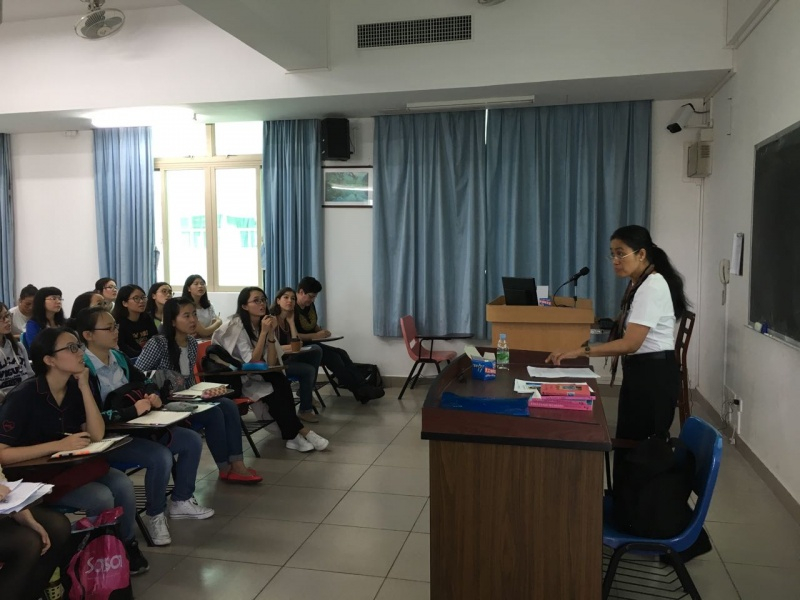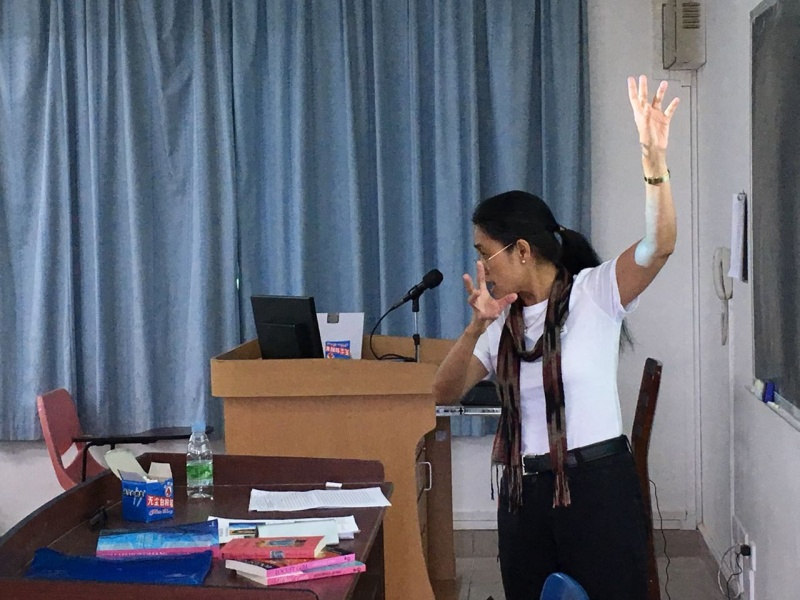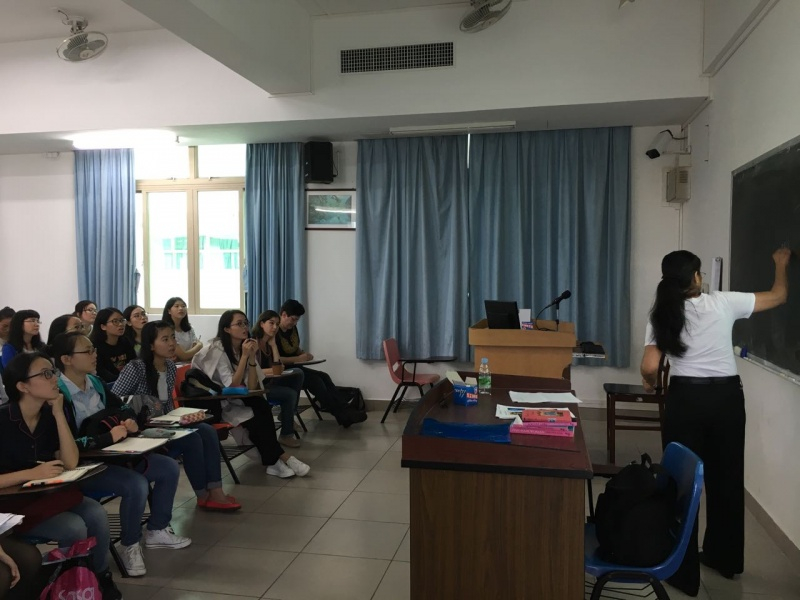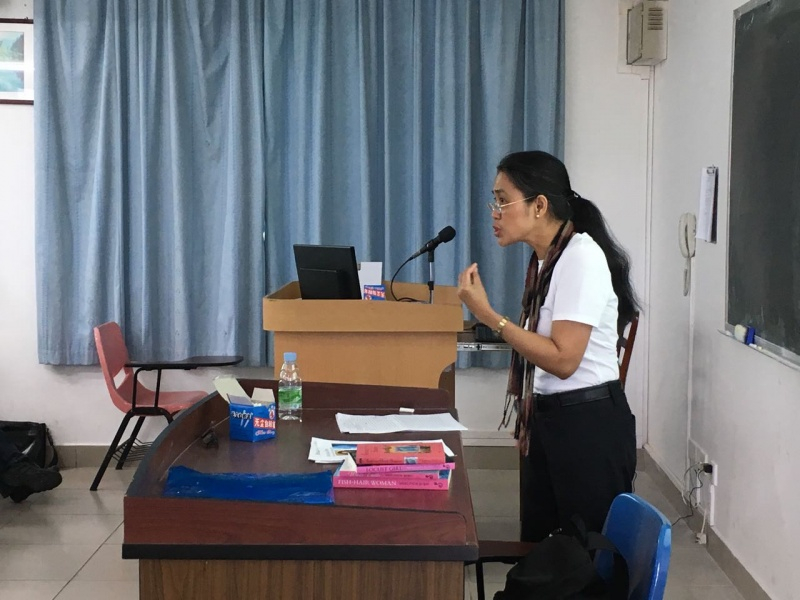The Lecture By Merlinda Bobis From the Sun Yat-sen University Writers’ Residency
November 17, 2016
By Nazlı İnal
On Monday, November 7, 2016 three writers from the Sun Yat-sen University Writers’ Residency traveled to Zhuhai to deliver lectures to the undergraduates who study in the Zhuhai campus. Merlinda Bobis spoke to the second year English majors about the creative process of a writer who thinks, writes, and lives in three different languages. Bobis, originally from the Philippines, is fluent in Bikol, Tagalog, and English.
Bobis started her lecture with a quote from the Spanish poet Garcia Lorca, “Pero yo ya no soy yo / ni mi casa es ya mi casa,” “But I am no longer I, / nor is my home now my home,” which she used to explain the pain of homesickness, the grief of a person who has moved to another country, culture, and language. As she was trying to cope with the displacement she was feeling upon moving to Australia at first she wasn’t able to write. But later she started writing concrete poetry using all three of her languages. “Think water,” she said to the classroom. “You need to move from a fixed structure towards something fluid, from house to water. Think water.” Concrete poetry can be very simply defined as the poetry where the shape of the poem is saying something as well as its content. Bobis was writing poems in three languages in three panels, below which she would combine the languages without worrying about grammar or even punctuation. The point was to convey the feeling, the fluidity of water, which is the source of kinship.
Kinship, and places of kinship, i.e. coexistence, are very important to Bobis, as they have been to many a philosopher and poet for centuries. Bobis remarked that all around us the nature functioned in perfect harmony and coexistence and that all we had to do was to tune into this effortless perfection if we wanted to bring it into our creative work. But we didn’t have to be writers and poets either, there was already so much to learn from the birdsongs, from the trees that housed the birds, or on a micro scale, from chemical compounds, where two hydrogen atoms combined with one oxygen atom to create water. The intention to coexist, the possibilities and places of kinship are all around us, and they create a culture of care, a culture of empathy, open and available to us. When Bobis repeated the two lines from Garcia Lorca that she opened her lecture with, the self and the house that were referred as “not mine” have since become ours. I was no longer I because I am a little bit of everybody, nor was my house now mine, because I share it with everybody else.
Bobis also likened the heart to a house. The heart, like a house, has chambers, but it is not anything solid that fills these chambers, rather it is blood, something fluid, like water. In the end the two most importance concepts of her lecture, the house and the water (fluidity) came together in perhaps the most metaphorically used of all our organs, a fist-sized muscle, though she prefers not to think of it as a fist, which is closed, tight and hard, and can imply violence. Throughout her lecture, covering a spectrum from chemical compounds to Octavio Paz’s essays on writing, Bobis also read and sang from her books, and at the end answered as many questions from the students as time allowed.
After the reading 吴林蔓 (Sylvia Wu) commented, “I was very impressed by her poem of the “stone” in three languages. Reading after her, I could really feel the three languages were flowing like water in my body. Her idea about writing attracted me, too. That the idea writing is recovering and reviewing what has disappeared made me think a lot. And her singing was wonderful!” 徐雪莹 (Aurora Xu) was also impressed by Bobis’s poem making use of three languages at once, and she said, “I think I got some inspiration from her parallel usage of three languages. I appreciated her unique and intriguing performance a lot!”
Bobis’ lecture has also moved students to think about their lives and times. 谢雨辰 (Emma Xie) said she realized she didn’t really know the history of her hometown when Bobis said, “Write story about your hometown, about your own history. Record it so as not to forget it.” Emma added, “I think writing is a good way to find your identity,” as she reflected on the lecture. 周彦芸 (Alison Zhou) was touched by the humanity of the lecture. She said, “Bobis’s idea that humans can survive only by caring for each other, and caring for the whole world impressed me the most. Since the people now are unwilling to pay much attention to others, this can definitely help us reflect upon ourselves. We now are physically connected by technology, but we still need to be concerned about others’ feelings and thoughts, to understand and respect different cultures.”
You can find more about Merlinda Bobis on her website merlindabobis.com.au





